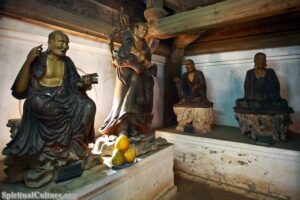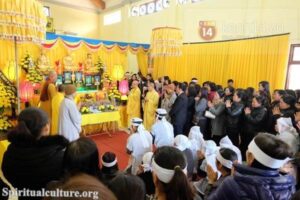Asalha Puja, also known as Dhamma Day, is one of the most significant observances in Buddhism. This sacred day commemorates the Buddha’s first sermon to his initial group of five disciples, a pivotal event that laid the foundation for Buddhism’s subsequent growth and proliferation. As we delve into the profound significance of Asalha Puja, we will gain a deeper understanding of Buddhism’s teachings and practices.
The Origin of Asalha Puja
Asalha Puja falls on the full moon day of the eighth lunar month, traditionally known as Asalha. This day marks the Buddha’s first discourse, called the Dhammacakkappavattana Sutta, following his enlightenment. The sermon, delivered at the Deer Park in Benares, India, outlined the Four Noble Truths, the foundational principles of Buddhism. These truths address the reality of suffering, its causes, its cessation, and the path leading to its cessation. Hence, Asalha Puja is a celebration of the Buddha’s enlightenment and the birth of Buddhism.
Understanding Buddhism Through Asalha Puja
Buddhism, a spiritual tradition that originated in the 6th century BCE, revolves around the teachings of Siddhartha Gautama, known as the Buddha. Buddhism emphasizes personal spiritual development, ethical conduct, and the pursuit of a deep insight into the true nature of life. The observance of Asalha Puja serves as a vivid reminder of these fundamental tenets.
The Four Noble Truths expounded during the Buddha’s first sermon, are central to understanding Buddhism. These truths are the truth of suffering (Dukkha), the truth of the origin of suffering (Samudaya), the truth of the cessation of suffering (Nirodha), and the truth of the path leading to the cessation of suffering (Magga). These principles form the philosophical heart of Buddhism, guiding individuals on their spiritual journey towards enlightenment.
Celebrating Asalha Puja
Asalha Puja celebrations vary across different Buddhist traditions, but all share the common aim of commemorating the Buddha’s first sermon and honoring his teachings. The day is typically marked by visiting temples for special sermons, meditation sessions, and ritualistic chanting of the Dhammacakkappavattana Sutta. Devotees make offerings of flowers, incense, and candles, symbolic of the impermanence of life that Buddhism underscores.
Many Buddhists observe the Eight Precepts on Asalha Puja, more stringent moral guidelines compared to the usual Five Precepts. These include abstaining from killing, stealing, sexual activity, wrong speech, intoxicating substances, eating after noon, entertainment and decorative accessories, and luxurious beds. Observing these precepts is seen as a means of purifying oneself and cultivating virtue.
Asalha Puja also marks the beginning of Vassa, the three-month rain retreat for monastic communities. This period is often used for intensive meditation and deepening one’s understanding and practice of the Dhamma (Buddha’s teachings).
In Conclusion
Asalha Puja is more than just a religious observance; it is a celebration of the wisdom and teachings of the Buddha that form the bedrock of Buddhism. It serves as a reminder of the path towards enlightenment, encouraging Buddhists worldwide to practice mindfulness, cultivate virtue, and strive for the cessation of suffering. As we commemorate Asalha Puja, we not only honor the Buddha and his teachings but also reaffirm our commitment to walking the path of Dhamma, fostering a deeper connection with the essence of Buddhism.

















Comments (0)